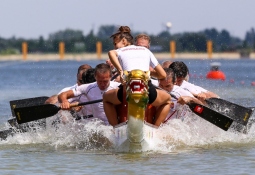The first year of an Olympic cycle for canoe sprint athletes can often be shrouded in mystery, as teams experiment with new athletes in new boats, trialing different combinations over different distances, and gently feeling their way with any new events on the Olympic program.
But there’s a sense of urgency already this year, with a three-year Olympic cycle instead of the usual four. There’s little time for teams to dilly-dally as they look towards Paris in 2024, which will feature new distances for the men’s C2 and K2.
Already we are seeing some teams take the same approach they took when the K4 was reduced from 1000 to 500. Jack rabbit sprinters over 200 metres were paired with 1000 metre powerhouses to get a combination that could go fast at the start, in the middle, and at the end.
It’s no secret that the best two exponents of this were the Germans and the Spanish, who also embraced the change the earliest. Not surprisingly, they dominated almost every K4 500 event up to and including the Tokyo Olympics, taking home the gold and silver from Tokyo.
In Racice last weekend there were some intriguing combinations in both the men’s K2 and C2 500, and in Poznan there will be more fine tuning.
There is also movement in the women’s team boats, with retirements and athletes taking a break after Tokyo. New Zealand’s Lisa Carrington will need a new K2 500 partner for Paris, after the retirement of her gold medal partner Caitlin Regal after Tokyo.
Hungary’s Danuta Kozak and Tamara Csipes are both taking a post-Olympics break, Australia’s Alyce Wood is about to have a baby, and paddlers from Belarus and Russia will be absent until further notice.
But one team who is still going strong, and has already staked its claim as world championship gold medal favourites after an impressive win in Racice, is Poland’s Karolina Naja and Anna Pulawska.
Naja and Pulawska also form the backbone of Poland’s formidable women’s K4 boat, and will be looking to continue their development in both races this weekend in front of a home crowed in Poznan.
Pulawska believes the key to their success is the bond they have both in and out of the boat.
“A lot of people tell me that Karolina is my third sister,” Pulawska said.
“So yes we are friends, and we are happy training together. Every time we train together is a validation and we get even stronger.”
Asked what happens when one of them is having a bad day – “It doesn’t happen. Neither of us get grumpy.”
This weekend will be the first opportunity for Naja and Pulawska to race in an international event in front of their fans since they won silver (K2) and bronze (K4) in Tokyo.
They say they’re not nervous, but they want to put on a good show.
“Our results in Tokyo were great for Polish canoeing, and for us as well,” Pulawska said.
“We were very happy, but for us now that is history. Now we are stronger and we are already looking forward to our next race this season. For us and the K2, we know what we want and we know how to do it better.
“We do feel a bit of pressure, but we just need to be stronger than we were at the Olympic Games. We hope there are a lot of Polish people who will come out to support us.”
The ICF canoe sprint world cup begins on Thursday and runs through until Sunday.

